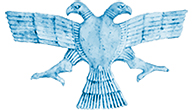Proto-Indo-European Lexicon
The generative etymological dictionary of Indo-European languages
The Proto-Indo-European Phoneme Inventory
© 2014-2026 University of Helsinki
"Durch zweier Zeugen Mund wird alle Wahrheit kund" — August Fick(PRINCIPLE of POSTULATION)
PIE
PIE √e- (pron.) ‘dieser’
√e-
1. PIE *e·hɑu-
PIE *ɑ → Ø
Loss of *ɑ
Rɑ›0 → *e·hu-
(SPIE §2.2.4)
2. e·hu-
PIE *h/ɦ → Hitt. ḫ
Orthographic change of *h/ɦ into ḫ
RH›ḫ → Hitt. e·ḫu-
(SPIE §4.6.3)
1. PIE *e·ni·son
PIE *o → a
Change of *o into a
Ro›a → *e·ni·san
2. e·ni·san
PIE *s → š
Orthographic change of *s into š
Rs›š → Hitt. e·ni·šan
(Pyysalo 2013:XX)
1. PIE *e·diɑHó
PIE *ɑ → Ø
Loss of *ɑ
Rɑ›0 → *e·diHó
(SPIE §2.2.4)
2. e·diHó
PIE *ó → á
Change of *ó into á
Ró›á → *e·diHá
3. e·diHá
PIE *H → .
Metric hiatus from PIE *h/ɦ
RH›' → *e·di.á
4. e·di.á
*e → a
Change of *e into a
Re›a → RV. a·di.á
 The PIE Lexicon Project licenses its data, linguistic results and finite-state encoded rules under a Creative Commons Attribution-ShareAlike (CC BY-SA) license.
The PIE Lexicon Project licenses its data, linguistic results and finite-state encoded rules under a Creative Commons Attribution-ShareAlike (CC BY-SA) license.

